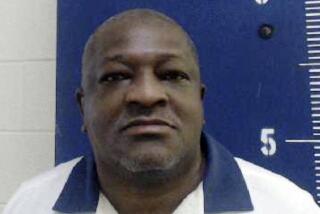Woman About to Die Is Granted Clemency in Illinois
- Share via
CHICAGO — The state of Illinois was prepared to execute Guinevere Garcia by lethal injection at 12:01 a.m. today. And Garcia, having dropped her remaining appeals, wanted to die.
But responding to an Amnesty International request, Gov. Jim Edgar--a Republican who favors the death penalty--on Tuesday granted clemency to Garcia against her will. He commuted her sentence for the 1991 murder of her second husband to life in prison without parole.
“It is not the state’s responsibility to carry out the wishes of a defendant,” Edgar said in a statement read by William Roberts, counsel to the governor, in the state capital of Springfield. “It is the state’s responsibility to assure that the death penalty continues to be administered properly.”
“Stay out of my case,” Garcia, 37, had admonished Amnesty International spokeswoman Bianca Jagger in a tape played at a clemency hearing last week.
Nonetheless, Jagger asked that the governor block the execution on the grounds that Garcia was abused most of her life: raped repeatedly when she was 6 by her uncle, sold at 16 for $1,500 by her grandfather to an Iranian immigrant seeking a citizen to marry.
While drunk at age 18, Garcia smothered her 11-month-old daughter, saying later that she was trying to protect the child because her brutal relatives might seek custody. She served 10 years of a 20-year prison sentence for killing the girl and setting four fires.
George Garcia, the husband she met when she was a prostitute and he her customer, once used a broken bottle to cut a two-inch wound in her vaginal wall, according to court records. Within weeks of leaving prison, she left Garcia because he had slapped her. Months later, she attempted to rob him and within a few minutes had shot him to death.
“She is so much the victim,” Jagger said. “The legal system has failed her.”
Edgar has commuted the sentences of seven battered women convicted of murder--but none sent to Death Row--and has denied clemency requests from six other killers--all men--condemned to die.
But Edgar rejected the notion that Garcia suffers from “battered woman syndrome.” He said that he was swayed instead by the nature of the crime--her intent to take money, not life. “This is not the kind of case I had in mind when I voted as a legislator to restore the death penalty and acted as governor to expand it,” his statement read.
Edgar “could commute half the people on Death Row on that basis,” said Richard Dieter, executive director of the Washington-based Death Penalty Information Center.
“He wrestled with it,” Roberts said. “With a life sentence, the safety of our citizens was not an issue. What kind of prisoner had Garcia been became an issue.” Corrections officials said she had not been violent in custody.
“The governor implicitly acknowledged that the death penalty is not necessary,” said Patrick J. Cotter, a professor at Chicago-Kent College of Law.
But, Roberts cautioned: “I would not hold my breath waiting for the next one. Just because he did it once does not mean he will do it again.”
Last March, after the Illinois Supreme Court voted, 5 to 2, to affirm her sentence, Garcia was adamant about abandoning legal efforts that could have delayed the execution for years. “She said a great weight had been lifted from her shoulders,” said Father Jonas Callanan, a Catholic priest who often visits Garcia at Dwight Correctional Center.
Callanan administered last rites on the same day as the clemency hearing. Despite the heated message on her tape, Callanan said, Garcia told him that if the governor halted the execution, “she would take it as a sign of God’s will.”
On Tuesday, said her attorney, Manos M. Kavvadias, an exhausted Garcia was “relieved. It’s hard to understand, this juxtaposition of ‘Let’s do it’ and ‘Thank God this happened.’ But if you understand [Garcia], you understand she felt them both.”
More to Read
Sign up for Essential California
The most important California stories and recommendations in your inbox every morning.
You may occasionally receive promotional content from the Los Angeles Times.













